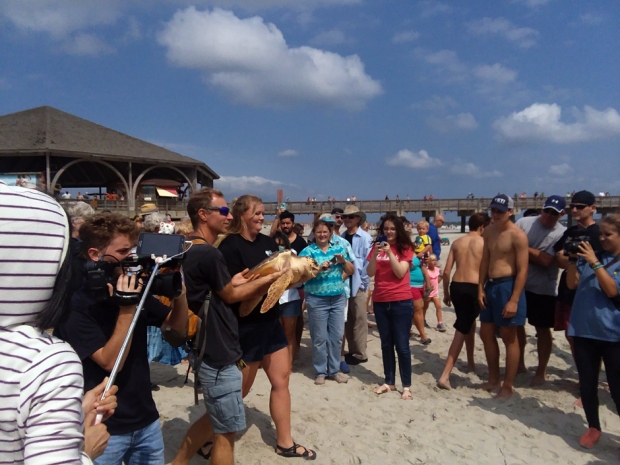[ I am a Community Solutions Program fellow. Hosted by the NOAA’s Georgia Sea Grant College Program and based at the Athens and Skidaway Island campuses of the University of Georgia’s Marine Extension Service. The practicum part of my fellowship has ended this week with an End of Program workshop held at a hotel in Washington, D.C. Following is the script of my EOP speech which I shared with international fellows. Here, it’s slightly edited for clarity. ]
We, underwater divers, sometimes joke about ourselves; that is, diving is a lazy person’s adventure. Because, in the depth of the sea, the slow and steady you swim, the better you navigate. For me, it’s true about life on the land also. Slow and relying on others to lead together. It’s all about doing things we love with the people we love.

And, it’s been quite a few months like that, as we are on this fellowship; to me, it feels like the first workshop here in DC, the first time we’ve met DD was just days ago. For me, the last few months were very peaceful; working with wonderful colleagues was almost like a drift-dive with sea turtles. It feels like time is flying by.
Dear fellows and guests! My thematic focus is ‘Environmental Issues,’ and my leadership journey is about PEOPLE. Back in Bangladesh, it started with me and a few of our friends’ commitment to the people living in the northeastern Indian Ocean region, one of the most climate-vulnerable communities in the world.

As for our teams in Bangladesh, the strength is our shared life experience as a people facing an unprecedented loss of social resilience and ecosystem services. Our trust in people’s power led us to build a network of conservation movements. Throughout the networks, we always prioritize knowledge collaboration and learning-sharing. It’s one of our core approaches.
Also, these conservation groups are unconventional because it’s not about animal biology; we have people from all of the wakes of life, professionals from all disciplines collaborating for mainstream conservation into policies and practices.

What drives us is the commitment to institutionalize community action to build locally-led efforts for conservation. We have had a few successes. To proceed, we have a lot to do with very unjust Natural Resources Management Regimes and approaches worldwide.
The state of my practicum, Georgia, faces very similar challenges. To me, last few months, it never felt like a foreign country. As a Scholar-in-Residence with the National Oceanic and Atmospheric Administration’s Sea Grant Program based at the University of Georgia, one of my projects was to prepare a coastal public education program that will diversify the participants. During the planning phase, as part of the conversations with local families in the coastal city of Savannah, many people said to me that environmentalism is for affluent people.

These lower and middle-income families don’t have a recreational fishing license or a villa on the beach. But they do suffer the most from the changing climate and increasing disasters. Many of them asked me, what’s in conservation for their children? They will move to inner cities anyway, looking for jobs. As a child born and raised in coastal Bangladesh during the decline of the coastal economy dependent on a healthy Ocean, their experience is very familiar to me. During the conversation with these families, one aspect of my talking points was, this feeling of being left out can be a starting point to take part, to prepare our young ones as the environmental stewards, to take over the policy process at the top. At a point during such a conversation in Skidaway Island, one of the mothers approached me and said, ‘I want you to be the mentor for my son, no matter wherever you stay.’

Her son, Scott the Junior, is an excellent artist at his age, and he told me he wants to be a Marine Biologist. We agreed to be a mentor and mentee. Last few months, there were a lot of moments like this. It was a blissful time for me. In this way, my life and leadership were always about people and will continue to be like that.
For now, with my host organization, we are planning to initiate a permanent conservation capacity-building program for early career professionals in five Bay of Bengal countries. It will be precisely a transboundary, collaborative learning for community action.
Dear fellows! To share is the most effective way to evaluate our works and develop. So, no matter what thematic area you are focused on, no matter which regions you are from, let’s share all of our experiences about the people we work with and work for. As a communicator, it will be my pleasure to collaborate with you based on shared experiences.
Many thanks for your attention, and remember that we can do the community works better if we do the learning-sharing better.


You must be logged in to post a comment.